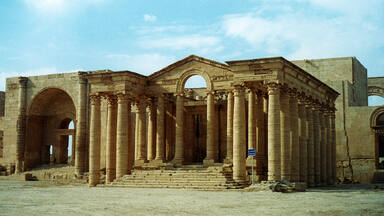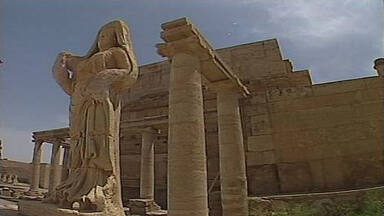UNESCO Director-General welcomes the liberation of Hatra and will send Emergency Assessment mission “as soon as possible”
Following several reports and discussions with the Iraqi authorities, UNESCO has confirmed the liberation of the archeological site of Hatra, located in the Governorate of Nineveh in Iraq. The Director-General of UNESCO, Irina Bokova, has reiterated her support to the government and people of Iraq and expressed the readiness of UNESCO to help protect and promote Iraqi heritage as a force for national cohesion, peace and recovery for the country.
“The liberation of the ancient city of Hatra, a UNESCO world heritage site, is good news for Iraq and beyond. For two years, Hatra has been one of the symbols of the cultural cleansing plaguing the Middle East. The destruction and looting of the remains of the capital of the first Arab Kingdom, is an immense loss for the Iraqi people and the world. Its liberation marks a positive turning point and paves the way for ensuring its protection and conservation,” declared the Director-General.
“Violent extremists know the power of heritage to unite, to bring people together and provide them with pride, confidence and dignity – this is why they target and destroy heritage. The protection of heritage has become more than a cultural issue – it is also a security issue, and this is the spirit of the recent resolution 2347 adopted unanimously by the UN Security Council on 24 March, putting culture at the heart of international efforts to build peace” said Irina Bokova. “The deliberate destruction of heritage is a war crime, and UNESCO will do everything in its power to ensure these crimes do not go unpunished. I call on all parties to preserve this unique heritage as an essential condition for peace and the future of the region,” Ms. Bokova added.

Hatra (Iraq) circa 2002 © UNESCO/Véronique Dauge
Preliminary reports confirm that Hatra has suffered further destruction since the city was taken in 2015. As soon as security conditions allow, UNESCO will send, in cooperation with the Iraqi government, a rapid emergency assessment mission to evaluate damage more precisely and take emergency safeguarding measures. This is essential prior to preparing conservation management plans for the site and to support communities in regaining confidence.
A crossroad of cultures since the dawn of humanity, Hatra represents one of Iraq's most iconic sites. It attests to the wealth and diversity of Iraqi and Arab identity. By the 3rd century BC, it was a fortified Arab principality that later on became the capital of the Kingdom. It comprised a large fortified city that withstood Roman invasions in A.D. 116 and 198 due to its high, thick walls, reinforced by towers. The architecture of Hatra is characterized by a unique blend of Hellenistic and Roman styles, with Eastern decorative features as a testimony to the greatness of Iraqi civilization. The site was inscribed as the first Iraqi UNESCO World Heritage site in 1985. It has been inscribed on the List of World Heritage in Danger since 2015.
The bulldozing and pillage of its treasures and carved reliefs in 2015 sparked unanimous indignation and strengthened international mobilization in favor of the values and heritage that unite all humanity. On 23-24 February 2017, UNESCO held an International Coordination Conference on the Safeguarding of Cultural Heritage in Liberated Areas of Iraq, laying the ground for an emergency, medium and long term action plan to preserve the country’s cultural heritage.


